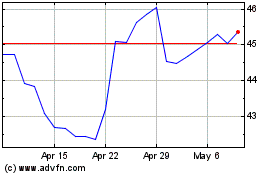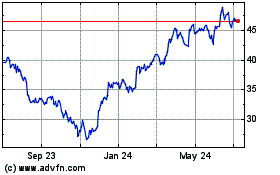GM Scales Back Maven Ride-Sharing Business-5th Update
May 20 2019 - 7:26PM
Dow Jones News
By Mike Colias
General Motors Co. said it will wind down its Maven car-sharing
service in eight of its 17 North-American cities, becoming the
latest car maker to face challenges in expanding into new
transportation ventures.
Maven plans to terminate its business in major markets such as
Chicago and Boston within the next few months, said a GM
spokeswoman, who declined to provide a full list of closures. The
service, launched in 2016, will continue to operate in Los Angeles,
Washington, D.C., Detroit, Toronto and other cities, she added.
"We're shifting Maven's offerings to concentrate on markets in
which we have the strongest current demand and growth potential,"
the company said in a statement. GM declined to elaborate on the
specific reasons why it was ending service in the eight
markets.
An email sent to one Maven customer in Chicago said the service
would wind down there by July 26.
With Maven, GM is hoping to respond to the proliferation of
app-based transportation services that have become popular in
today's economy, which many auto executives also view as a
long-term threat to car ownership.
The move comes as Uber Technologies Inc. -- a ride-hailing firm
that served as a model for many car makers trying new
transportation avenues -- is facing its own difficulties. Its has
continued to post steep losses and its stock has slumped following
its IPO earlier this month.
GM, like other car makers, also has been testing other new
services that allow people to get around without owing a car,
including a plan to launch a ride-hailing business powered by
self-driving taxis by the end of this year.
Maven lets customers in urban areas rent cars on a short-term
basis using an app on their smartphone. The brand also provides
short-term vehicle rentals to Uber Technologies Inc. and Lyft Inc.
drivers for their ride-hailing operations. Private car owners can
also use the Maven app to rent out their vehicles to other
individuals. GM also operates Maven in Australia.
In January, Maven chief Julia Steyn left GM after leading the
division since its inception. GM didn't give a reason for her
departure. Ms. Steyn, a former Goldman Sachs and Alcoa executive,
didn't reply to requests for comment.
The car-sharing business, while around for many years, is still
tiny compared to the ride-hailing industry, according to
consultancy AlixPartners LLP. Car-sharing generated an estimated $2
billion in global revenue in 2016 and is forecast to grow to $5
billion by 2030, the firm said. Ride-hailing generated $36 billion
in 2016 and is set to grow to nearly $300 billion annually by 2030,
the consultancy said.
Other traditional auto makers have scaled back or scrapped
similar services in recent years after struggling to grow them.
In January, Ford Motor Co. pulled the plug on Chariot, a
private-shuttle service it purchased several years ago in a push to
diversify beyond its core car-manufacturing business. Chariot
operated van fleets in San Francisco, New York and Austin, Texas,
but struggled to expand beyond a fixed, bus-like route and was
losing money, according to people familiar with the matter.
Several other car makers, including GM's Cadillac brand, have
dabbled in subscription services for cars that let customers pay
one monthly fee to swap in and out of models. But some car
executives have said the business model is a logistical challenge
and difficult to grow.
Cadillac canceled its subscription business late last year but
plans to relaunch the services after making adjustments.
Austen Hufford contributed to this article.
Write to Mike Colias at Mike.Colias@wsj.com
(END) Dow Jones Newswires
May 20, 2019 19:11 ET (23:11 GMT)
Copyright (c) 2019 Dow Jones & Company, Inc.
General Motors (NYSE:GM)
Historical Stock Chart
From Mar 2024 to Apr 2024

General Motors (NYSE:GM)
Historical Stock Chart
From Apr 2023 to Apr 2024
